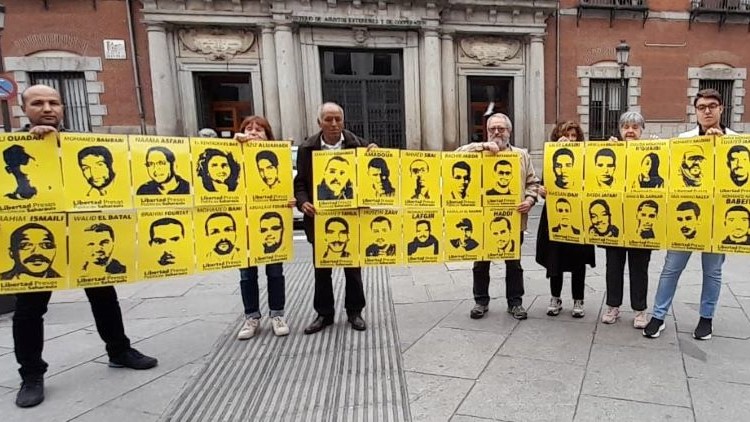Eduardo González
The government has again resorted to generalities about the defense of human rights as a “guiding principle” of its foreign policy to avoid problems with Morocco, in this case to avoid the situation of the Saharawi political prisoners.
Last November 28, the Movement for the Saharawi Political Prisoners held a rally outside the headquarters of the Ministry of Foreign Affairs (it usually does it every Monday, the last one this past February 27) to deliver a letter to the Minister, José Manuel Albares, denouncing the situation of the prisoners, as recalled last December 12 the Popular Parliamentary Group in a parliamentary question in which it urged the Government to report on what had been its response to the letter and whether it had held meetings with this movement.
In its written response to the letter of the PP, signed last February 13, the Executive merely assured that “human rights are a guiding principle of the foreign policy of the government of Spain, so from the Ministry of Foreign Affairs, European Union and Cooperation are defended and promoted in all countries”. “Both in its bilateral contacts and in the framework of the European Union’s dialogue with the various States, Spain raises human rights issues globally and in individual cases,” concludes the Government’s short reply.
Recently, the Government also chose to respond with generalities and a mere declaration of intentions (in fact, with exactly the same words) to another parliamentary question of the PP on human rights in Morocco, specifically on the imprisonment of the lawyer, opposition leader and former Minister of Human Rights Mohamed Ziane, 80 years old and of Spanish nationality.
Both that parliamentary reply and the letter from the Saharawi Prisoners Movement came on the eve of the High Level Meeting with Morocco. Around the same time, Spanish Socialist MEPs voted in the European Parliament against a resolution critical of the human rights situation in Morocco, in the name of “responsibility and in favor of frank bilateral relations based on dialogue and understanding”.
Likewise, several parties of the parliamentary arc, from PP to EH Bildu, have been interested in the Cortes Generales or in the European Parliament in Morocco’s “judicial harassment” of Ignacio Cembrero, the journalist of El Confidencial who reported on Rabat’s involvement in the spying on the cell phones of several Spanish leaders through the Pegasus plot, a “hot potato” that the Spanish Government has also taken off its hands in order not to anger Rabat. Apart from this, the PSOE voted on February 14 in Congress against a bill to grant Spanish nationality to Saharawis born before the withdrawal of Spain in 1976 and to their descendants.
The letter
The letter to Albares, signed by Cristina Martinez Benitez de Lugo, activist of the Movement for Saharawi Political Prisoners, denounces the “mistreatment of Saharawi political prisoners in spite of the fact that the Moroccan representative, Omar Hilale, denies it before the UN”. Concretely, the letter reports on the situation of several Saharawi political prisoners, activists and journalists, linked in particular to hunger strikes, alleged torture, postponement of trials and sentences. “So many hunger strikes and so many abuses should ring alarm bells in the civilized world,” reads the letter. “You, whose Ministry proclaims itself to be a fierce defender of human rights wherever they are violated, should be concerned about these painful and unjust situations, but you do not do so, despite the obligation to watch over the Saharawis” and that “the United Nations marks Spain as the de jure administering power of Western Sahara”, it continues.
The Ministry, it continues, “is not interested in the Saharawi political prisoners or in anything which could negatively affect the image of Morocco”, as is “the case of the journalist Ignacio Cembrero, who has had to be supported by the Moroccan journalists themselves because of the judicial harassment he is suffering from the Moroccan regime”. “Another Saharawi-Spanish journalist, Mohamed Salem Buchraya, suffering from cancer, who only wanted to end his days in the company of his family in El Ayoun, has not received explanations for the sudden and indecorous expulsion that Morocco has given him, and to which Spain has not objected”, denounces the letter, which also regrets that the Spanish government has never pronounced itself “with regard to the expulsion of numerous Spaniards, among them parliamentarians, journalists and lawyers”. “All these cases should merit reflection,” it concludes.
Cristina Martinez Benitez de Lugo herself denounced on February 22 last the decision of the PSOE to vote against the bill to grant Spanish nationality “to those same Saharawis who were once Spanish”. “In contrast, four days earlier José Manuel Albares, Minister of Foreign Affairs, had hastened to offer Spanish nationality to 316 political prisoners expelled from Nicaragua and stripped of their Nicaraguan nationality,” the activist laments. “This outburst of solidarity contrasts with the 47 years of Moroccan occupation in which Spain has been slowly betraying more and more the Saharawi people”, she adds.







